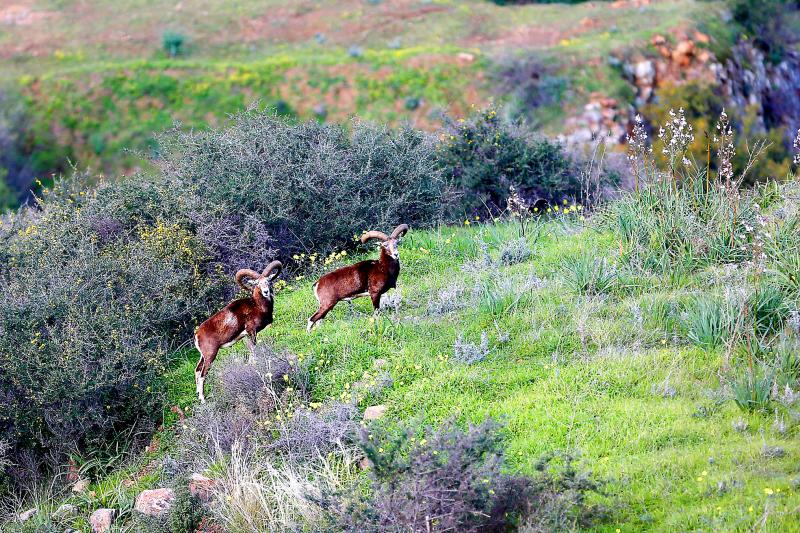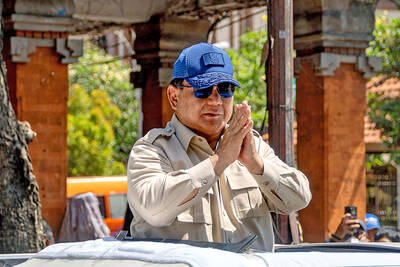In a long-abandoned village in the UN buffer zone that divides Cyprus, an endangered curly horned wild sheep offers hope not only for wildlife, but that bitter ethnic divisions might slowly be healed.
The mouflon, a majestic breed endemic to the Mediterranean island, is one of many species flourishing in the no man’s land created when inter-communal strife sliced Cyprus in two in the 1960s.
“Without human influence, the wildlife and plant life have flourished,” said Salih Gucel, director of the Institute of Environmental Sciences at Near East University in the breakaway Turkish Cypriot north.

Photo: AFP
“It is like stepping back in time to what our grandparents would have seen 100 years ago,” Gucel said, after spotting an orchid growing amid the tumbled ruins of a farmhouse in the village of Varisha, about 55km west of the capital, Nicosia.
Cyprus has been split since 1974 when Turkish forces occupied the northern part of the island in response to a Greek-sponsored military coup.
The buffer zone covers about 3 percent of the island, is 180km long and up to 8km wide.
Many call it the “dead zone,” a tragic reminder of a frozen conflict where bullet-riddled buildings crumble back into the dust.
Yet it is far from empty.
Farmers with permits can enter, while UN peacekeepers patrol the line, monitoring soldiers, watching for smugglers or for refugees hoping to cross.
However, it has also become a “haven” for rare plants and animals, a “wildlife corridor” linking otherwise fragmented environments right across the island, said ecologist Iris Charalambidou, from the University of Nicosia.
“It’s an area where species can escape intensive human activity,” Charalambidou said, adding that there were about 200 to 300 mouflon in the Variseia area alone, one-10th of the estimated 3,000 population.
“These are areas where biodiversity flourishes ... core populations of species that, when populations become larger, disperse to other areas,” she said.
Warily watching the rare human visitors, a pair of mouflon peer through an overgrown olive grove, turning tail long before wildlife experts — accompanied by Argentinian troops of the UN peacekeeping force — come close.
The mouflon, a national symbol once hunted to the brink of extinction, is not the only species thriving there.
Charalambidou said there were also threatened plants, including orchids, as well as rare reptiles and endangered mammals such as the Cyprus spiny mouse.
The experts said it shows how an embattled environment can recover if given a chance.
“When human activity is not so intense in a certain area, you see that nature recovers,” said Charalambidou, a Greek Cypriot from the government-controlled south of the island.
Gucel echoes her comments.
“Outside the buffer zone, herbicides have been used ... and orchids are picked or the bulbs dug up,” he said.
While the respective political leaders remain at loggerheads, the shared wildlife of the island has helped plant the seed of cooperation between the two sides.
“The political situation on the island remains really difficult,” said Aleem Siddique, spokesman for the UN peacekeeping force in Cyprus. “But there is still a lot of peacebuilding work that can be done at the grassroots level.”
That has included a UN-backed project identifying “biodiversity hotspots” inside the buffer zone, bringing scientists from the two communities together.
“One of the aims of our project was to get people who are interested in the environment in both communities to collaborate with each other,” Gucel said.
“We have a common goal and a common interest,” Charalambidou said, peering at yellow flowers poking through coils of rusting barbed wire.
For many islanders, there is little contact with those from the other side, the two communities apparently increasingly set on different paths and separate futures.
“The more that we can get the two communities working together, the more that we can get them to meet on common issues of concern, and that will benefit not only the environment, but also the peace process,” Siddique said.
In Cyprus, the history of division is impossible to ignore. On the hilltops above Variseia, soldiers in fortified watchtowers eye each other across the valley.
Below, Gucel and Charalambidou trace a mouflon track through a tangled almond orchard.
“People who work in environmental issues are usually so passionate about it that when they meet, they talk about that, and don’t bother talking about other issues,” Charalambidou said. “It unites people.”

DEADLOCK: Putin has vowed to continue fighting unless Ukraine cedes more land, while talks have been paused with no immediate results expected, the Kremlin said Russia on Friday said that peace talks with Kyiv were on “pause” as Ukrainian President Volodymyr Zelenskiy warned that Russian President Vladimir Putin still wanted to capture the whole of Ukraine. Meanwhile, US President Donald Trump said that he was running out of patience with Putin, and the NATO alliance said it would bolster its eastern front after Russian drones were shot down in Polish airspace this week. The latest blow to faltering diplomacy came as Russia’s army staged major military drills with its key ally Belarus. Despite Trump forcing the warring sides to hold direct talks and hosting Putin in Alaska, there

North Korea has executed people for watching or distributing foreign television shows, including popular South Korean dramas, as part of an intensifying crackdown on personal freedoms, a UN human rights report said on Friday. Surveillance has grown more pervasive since 2014 with the help of new technologies, while punishments have become harsher — including the introduction of the death penalty for offences such as sharing foreign TV dramas, the report said. The curbs make North Korea the most restrictive country in the world, said the 14-page UN report, which was based on interviews with more than 300 witnesses and victims who had

COMFORT WOMEN CLASH: Japan has strongly rejected South Korean court rulings ordering the government to provide reparations to Korean victims of sexual slavery The Japanese government yesterday defended its stance on wartime sexual slavery and described South Korean court rulings ordering Japanese compensation as violations of international law, after UN investigators criticized Tokyo for failing to ensure truth-finding and reparations for the victims. In its own response to UN human rights rapporteurs, South Korea called on Japan to “squarely face up to our painful history” and cited how Tokyo’s refusal to comply with court orders have denied the victims payment. The statements underscored how the two Asian US allies still hold key differences on the issue, even as they pause their on-and-off disputes over historical

CONSOLIDATION: The Indonesian president has used the moment to replace figures from former president Jokowi’s tenure with loyal allies In removing Indonesia’s finance minister and U-turning on protester demands, the leader of Southeast Asia’s biggest economy is scrambling to restore public trust while seizing a chance to install loyalists after deadly riots last month, experts say. Demonstrations that were sparked by low wages, unemployment and anger over lawmakers’ lavish perks grew after footage spread of a paramilitary police vehicle running over a delivery motorcycle driver. The ensuing riots, which rights groups say left at least 10 dead and hundreds detained, were the biggest of Indonesian President Prabowo Subianto’s term, and the ex-general is now calling on the public to restore their